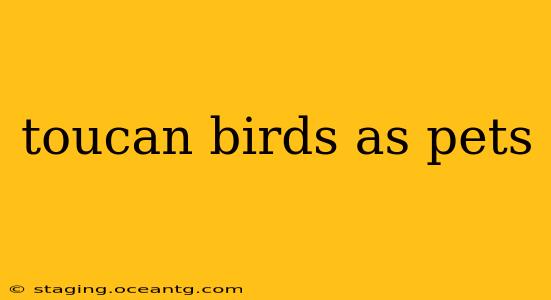Toucans, with their vibrant plumage and oversized beaks, are undeniably captivating birds. Their striking appearance often leads people to consider them as pets. However, owning a toucan is a significant commitment that requires extensive research and preparation. This guide explores the realities of keeping a toucan as a pet, addressing common questions and concerns.
Are Toucans Good Pets?
This is the most crucial question. While undeniably beautiful, toucans are not ideal pets for the average household. Their needs are complex and demanding, requiring specialized knowledge, significant space, and substantial financial resources. Their strong beaks can cause serious injury, and their boisterous nature might not be suitable for all living environments. Unless you're prepared to meet their specific requirements, choosing a different, more manageable pet is strongly advised.
What Do Toucans Eat?
Toucans are primarily frugivores, meaning their diet consists largely of fruit. However, a balanced diet also includes insects, small reptiles, and even the occasional bird egg in the wild. Providing a captive toucan with a varied and nutritious diet is crucial for their health and well-being. This typically involves a mix of commercially available toucan food, fresh fruits (like mangoes, bananas, papaya), vegetables, and occasional insects. Improper nutrition can lead to severe health problems.
How Long Do Toucans Live?
Toucans can live for 15 to 20 years, sometimes even longer in captivity with excellent care. This significant lifespan underscores the commitment involved in owning one. You must be prepared to provide for the bird's needs for a considerable period. This long-term responsibility should not be taken lightly.
How Much Does a Toucan Cost?
The initial cost of acquiring a toucan can be substantial, ranging from several thousand dollars to much more, depending on the breeder and the species. However, the ongoing costs are also significant. These include expenses for specialized food, a large enclosure, veterinary care (specialized avian vets are essential), toys, and enrichment items. Budgeting accurately for these costs is vital before considering a toucan as a pet.
What Size Cage Does a Toucan Need?
Toucans require exceptionally large cages. A small cage will not suffice; they need ample space to fly, climb, and express natural behaviors. The cage dimensions should be carefully considered based on the species, ensuring it's large enough to provide a comfortable and stimulating environment. Insufficient space can lead to stress, feather plucking, and other behavioral problems.
Are Toucans Legal to Own?
Legality varies significantly by location. Some areas have strict regulations or outright bans on owning toucans due to concerns about conservation and the potential for harm to the birds. Thorough research into local and national wildlife laws and regulations is paramount before acquiring a toucan. It's essential to obtain the necessary permits and licenses if legally permissible in your area.
What Are the Challenges of Owning a Toucan?
Beyond the cost and space requirements, several challenges are associated with keeping toucans. Their strong beaks pose a safety risk. Their loud calls can be disruptive. Their need for specialized care and diet is demanding. Finding a qualified avian veterinarian familiar with toucan health is crucial. And lastly, the legal aspects must be carefully considered to ensure compliance with all regulations.
Conclusion: Responsible Pet Ownership
Owning a toucan is a complex undertaking that demands significant commitment, resources, and knowledge. While their beauty is undeniable, prospective owners must carefully weigh the responsibilities involved before making such a decision. The long lifespan, specific dietary needs, housing requirements, and potential legal restrictions necessitate thorough research and planning. If you’re unsure if you can meet these demands, it's best to consider a more suitable pet.
